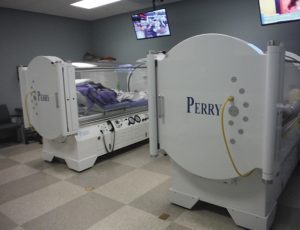By Sandra Reddick
 Hyperbaric oxygen therapy (HBOT) is a medical treatment that involves breathing in pure oxygen in a pressurized chamber.
Hyperbaric oxygen therapy (HBOT) is a medical treatment that involves breathing in pure oxygen in a pressurized chamber.
The therapy has been used to treat various medical conditions, including decompression sickness, carbon monoxide poisoning, and diabetic foot ulcers. In recent years, HBOT has gained popularity as a treatment for a range of other conditions. Here are some of the potential benefits of hyperbaric oxygen therapy:
1. Improved wound healing: HBOT increases the oxygen supply to damaged tissues, which promotes the growth of new blood vessels and helps to repair damaged tissues. This can be particularly beneficial for people with slow-healing wounds, such as diabetic foot ulcers or radiation-induced skin injuries.
2. Reduced inflammation: Inflammation is a key driver of many chronic diseases. HBOT has been shown to reduce inflammation in the body, which may help to improve symptoms in people with conditions like rheumatoid arthritis, Crohn’s disease, and ulcerative colitis.
3. Enhanced cognitive function: HBOT has been shown to increase blood flow to the brain, which may help to improve cognitive function. Studies have suggested that the therapy may be helpful for people with conditions like traumatic brain injury, stroke, and dementia.
4. Increased athletic performance: Some athletes use HBOT as a way to enhance their performance. The therapy has been shown to increase the amount of oxygen in the blood, which can improve endurance and reduce fatigue.
5. Reduced symptoms of depression and anxiety: HBOT has been shown to have a calming effect on the body, which may help to reduce symptoms of depression and anxiety. Some studies have suggested that the therapy may be helpful for people with post-traumatic stress disorder (PTSD).
While hyperbaric oxygen therapy has many potential benefits, it is important to note that the therapy is not appropriate for everyone. People with certain medical conditions, such as a collapsed lung or a history of seizures, may not be able to undergo the therapy. Additionally, HBOT can have side effects, including ear pain and temporary changes in vision. It is important to talk to a healthcare provider before undergoing hyperbaric oxygen therapy.
Why it’s done
Your body’s tissues need an adequate supply of oxygen to function. When tissue is injured, it requires even more oxygen to survive. Hyperbaric oxygen therapy increases the amount of oxygen your blood can carry. With repeated treatments, the temporary extra high oxygen levels encourage normal tissue oxygen levels, even after the therapy is completed.1
Hyperbaric oxygen therapy is used to treat several medical conditions. And medical institutions use it in different ways. Your health care provider may suggest hyperbaric oxygen therapy if you have one of the following conditions:
• Severe anemia.
• Brain abscess.
• Bubbles of air in your blood vessels, known as arterial gas embolism.
• Burns.
• Carbon monoxide poisoning.
• Crushing injury.
• Deafness, sudden.
• Decompression sickness.
• Gangrene.
• Infection of skin or bone that causes tissue death.
• Nonhealing wounds, such as a diabetic foot ulcer.
• Radiation injury.
• Skin graft or skin flap at risk of tissue death.
• Traumatic brain injury.
• Vision loss, sudden and painless.
Ocala Infectious Disease and Wound Center
Ocala Infectious Disease and Wound Center, the largest private center of its type in the Ocala, Florida, area, provides exceptional same-day and next-day care to patients from the Ocala area, The Villages, and the neighboring counties of Citrus, Lake, and Sumter. Haris Mirza, MD, and the team of infectious disease physicians have extensive experience diagnosing and treating infectious diseases and providing intensive care for slow-healing wounds and infections.
Managing an infectious disease and providing adequate care for a wound pose a major challenge to most patients. These health challenges often cause days off from work, high health care costs, and an uncertain prognosis. Patients find the care and support they need at Ocala Infectious Disease and Wound Center. The team goes a step beyond treating patients to provide disease education, increase social support, and improve the quality of life for patients and their families.
Infectious disease and wound specialists treat a vast number of conditions. The team at Ocala Infectious Disease and Wound Center take care of acute and chronic infections and wounds, frequently treating diabetic wounds, HIV, Lyme disease, venous leg ulcers, urinary tract infections, and lung conditions.
Patients also receive the most advanced and effective therapies. Wound care incorporates specialized dressings and bioengineered tissue substitutes. At Ocala Infectious Disease and Wound Center, hyperbaric oxygen therapy is provided using the industry’s largest and most comfortable chambers. They also offer infusion therapy and extensive lab work on-site, giving patients the convenience of comprehensive care in one location.
Ocala Infectious Disease and Wound Center
352-401-7552
www.ocalawoundcare.com
2651 Southwest 32nd Pl
Ocala, FL 34471
Reference:
1. https://www.mayoclinic.org/tests-procedures/hyperbaric-oxygen-
therapy/about/pac-20394380
 Central Florida Health and Wellness Magazine Health and Wellness Articles of the Villages
Central Florida Health and Wellness Magazine Health and Wellness Articles of the Villages



